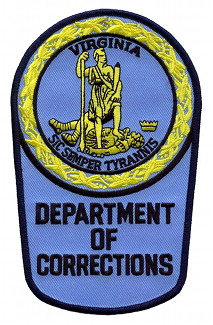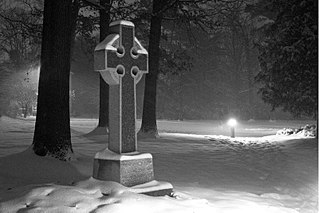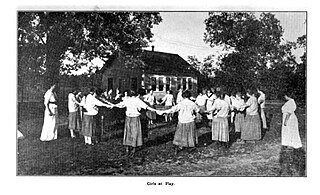Related Research Articles

Chesterfield County is a county located just south of Richmond in the Commonwealth of Virginia. The county's borders are primarily defined by the James River to the north and the Appomattox River to the south. Its county seat is Chesterfield Court House.

Bon Air is a census-designated place (CDP) in Chesterfield County, Virginia, United States. The population was 18,022 at the 2020 census. The community is considered a suburb of the independent city of Richmond in the Richmond-Petersburg region and is a part of the Southside neighborhoods. Originally developed as a resort, a central portion of Bon Air has been designated as a National Historic District with many structures of Victorian design from the late 19th and early 20th centuries. Its name means "good air," reflecting its role as a resort getaway that wealthy Richmonders enjoyed for its fresh air as opposed to the dirty air of Richmond's industrial downtown of the late 19th century.

The West Virginia Division of Corrections and Rehabilitation is an agency of the U.S. state of West Virginia within the state Department of Homeland Security that operates the state's prisons, jails and juvenile detention facilities. The agency has its headquarters in the state's capital of Charleston. The state incarcerates 273 women per 100,000 population, the highest rate of female incarceration in the world, ahead of all other states and foreign nations.

The California Division of Juvenile Justice (DJJ), previously known as the California Youth Authority (CYA), was a division of the California Department of Corrections and Rehabilitation that provided education, training, and treatment services for California's most serious youth offenders, until its closure in 2023. These youths were committed by the juvenile and criminal courts to DJJ's eleven correctional facilities, four conservation camps and two residential drug treatment programs. The DJJ provided services to juvenile offenders, ranging in age from twelve to 25, in facilities and on parole, and worked closely with law enforcement, the courts, district attorneys, public defenders, probation offices and other public and private agencies involved with the problems of youth. The DJJ underwent reorganization as required by a court agreement and the California State Legislature after widespread criticisms of conditions at its youth prisons. The agency's headquarters were in Sacramento, California.

Greensville Correctional Center is a prison facility located in unincorporated Greensville County, Virginia, near Jarratt. The prison, on a 1,105-acre (447 ha) plot of land, is operated by the Virginia Department of Corrections. Greensville houses the execution chamber that was used to carry out capital punishment by the Commonwealth of Virginia until the death penalty in Virginia was abolished in 2021.
Mecklenburg Correctional Center was a maximum security prison operated by the Virginia Department of Corrections in unincorporated Mecklenburg County, Virginia, United States, near Boydton. It was closed in 2012 due to a decrease in the number of inmates in the Virginia corrections system and expensive ongoing maintenance needs. The 189 acres (76 ha) facility served as a reception and classification facility.

The Virginia Department of Corrections (VADOC) is the government agency responsible for community corrections and operating prisons and correctional facilities in the Commonwealth of Virginia in the United States. The agency is fully accredited by the American Correctional Association and is one of the oldest functioning correctional agencies in the United States. Its headquarters is located in the state capital of Richmond.

The Texas Youth Commission (TYC) was a Texas state agency which operated juvenile corrections facilities in the state. The commission was headquartered in the Brown-Heatly Building in Austin. As of 2007, it was the second largest juvenile corrections agency in the United States, after the Florida Department of Juvenile Justice. As of December 1, 2011, the agency was replaced by the Texas Juvenile Justice Department.
The District of Columbia Department of Corrections (DCDC) is a law enforcement agency responsible for the adult jails and other adult correctional institutions and law enforcement buildings for the District of Columbia, in the United States. DCDC runs the D.C. Jail.
The Florida Department of Juvenile Justice (FDJJ) is a state agency of Florida that operates juvenile detention centers. Its headquarters are in the Knight Building in Tallahassee.
The North Carolina Department of Juvenile Justice and Delinquency Prevention (DJJDP) was a state agency of North Carolina, headquartered in Raleigh. The agency operates juvenile corrections facilities in the state. It is now a part of the North Carolina Department of Public Safety.

The Georgia Department of Juvenile Justice (DJJ) is a state agency of Georgia, United States, headquartered in Avondale Estates, near Decatur and in Greater Atlanta. The agency operates juvenile correctional facilities.

The Alaska Division of Juvenile Justice is a state agency of Alaska that operates juvenile correctional facilities; it is a division of the Alaska Department of Family and COmmunity Services. The agency has its headquarters in Juneau.
The South Carolina Department of Juvenile Justice (DJJ) is a state agency of South Carolina, headquartered in Columbia. The agency operates juvenile correctional facilities. The department derives their authority from Title 63 Chapter 19 of the South Carolina Code of Laws.
Fluvanna Correctional Center for Women is a prison operated by the Virginia Department of Corrections. It has a Troy postal address, and is in unincorporated Fluvanna County, about 55 miles (89 km) northwest of Richmond. The security level 3 facility housed 1,199 female inmates as of June 2008, including formerly housing the women's death row for the Commonwealth of Virginia.

Bon Air Presbyterian Church (PCUSA), which began in 1884, is an historic Presbyterian church and preschool located on Huguenot Road in Bon Air, Virginia, a census-designated place (CDP) in Chesterfield County, Virginia, in the United States. The church and its location are thought to be named after the French term for "good air". The name choice may have been influenced by the 18th century settlement in the region of religious refugee French Huguenots and by the later popularity of the settlement as a summer resort and park accessible by streetcar from Richmond. Bon Air Presbyterian Church first began worshiping in a little Victorian Gothic building known as the “Union Chapel", located on Buford Road, south of the James River in the Southside of Richmond. "Union Chapel" served the Bon Air Presbyterian congregation until 1963. The number of members grew, and a new church building was erected at 9201 West Huguenot Road in North Chesterfield, Virginia to meet the needs of the larger congregation.

The Barrett Juvenile Correctional Center, also known as the Barrett Learning Center and originally as the Virginia Industrial Home School for Wayward Colored Girls and then the Virginia Industrial Home School for Colored Girls, was a residential industrial school and later a juvenile correctional facility operated by the state of Virginia near Mechanicsville, Virginia.

Incarceration in California spans federal, state, county, and city governance, with approximately 200,000 people in confinement at any given time. An additional 55,000 people are on parole.

The Virginia Home and Industrial School for Girls, a reformatory, opened in 1910 in Bon Air, Chesterfield County as a private charity to confine and train “incorrigible” White girls under the age of eighteen. Black girls were sent to the Virginia Industrial Home School for Colored Girls.
References
- ↑ "Home." Virginia Department of Juvenile Justice. Retrieved on August 13, 2010. "Department of Juvenile Justice 700 East Franklin Street, 4th Floor, Richmond, VA 23219."
- ↑ "DJJ 404 Error" (PDF). www.djj.virginia.gov.
- ↑ "DJJ executive staff". virginia department of juvenile justice. Retrieved 7 September 2021.
- ↑ "Residential Programs." Virginia Department of Juvenile Justice. Retrieved on August 13, 2010.
- ↑ Phillips, Louis C. (1914). Pollard's Code Biennial 1914: Containing All Statutes of a General and Permanent Nature Passed by the General Assembly of Virginia. Richmond, VA: Everett Wadey Co. pp. 424–426. Retrieved 3 July 2018.
and all its property, consisting of a tract of land in the County of Chesterfield Virginia, containing two hundred and six acres
- ↑ Shepherd, Samuel C. Jr (2001). Avenues of Faith: Shaping the Urban Religious Culture of Richmond, Virginia. Tuscaloosa and London: University of Alabama Press. p. 120. ISBN 0-8173-1076-2 . Retrieved 3 July 2018.
- ↑ Report of State Board of Charities and Corrections. Richmond, VA: Virginia. Dept. of Public Welfare. 30 September 1910. p. 46. Retrieved 3 July 2018.
- ↑ "Bon Air Juvenile Correctional Center." Virginia Department of Juvenile Justice. Retrieved on August 13, 2010. "Address: 1900 Chatsworth Avenue, Richmond, Virginia 23235"
- ↑ "." Virginia Department of Juvenile Justice.
- ↑ "Barrett Juvenile Correctional Center." Virginia Department of Juvenile Justice. Retrieved on August 13, 2010.
- ↑ "Beaumont Juvenile Correctional Center." Virginia Department of Juvenile Justice. Retrieved on December 15, 2015. "3500 Beaumont Road, Beaumont, Virginia 23014"
- ↑ "."
- ↑ "Culpeper Juvenile Correctional Center." Virginia Department of Juvenile Justice. Retrieved on August 13, 2010.
- ↑ "" Fredericksburg.com Retrieved September 18, 2017.
- ↑ Simmons, Rhonda (2017-07-12). "Planned Culpeper women's prison delayed, again". Culpeper Star-Exponent . Retrieved 2018-10-07.
- ↑ "Hanover Juvenile Correctional Center." Virginia Department of Juvenile Justice. Retrieved on August 13, 2010.
- ↑ "About Us".
- ↑ "Natural Bridge Juvenile Correctional Center" (Archive). Virginia Department of Juvenile Justice. Retrieved on December 15, 2015.
- ↑ "Oak Ridge Juvenile Correctional Center." Virginia Department of Juvenile Justice. Retrieved on August 13, 2010.